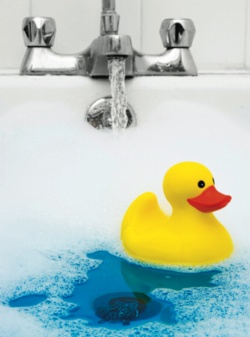Hot water still burns like fire

The temperatures that render hot water safe from bacteria are nevertheless dangerous to people — but there is no need for this risk, as Terry Rowbury explains.
Between 2009 and 2010, 643 people in England were admitted to hospital with scalding injuries. Most of them were children, who, along with the elderly, are the most vulnerable to severe hot-water injury. Yet this number could have been significantly reduced by the use of thermostatic mixing valves (TMVs) to control the temperature of hot water to taps, baths and showers.
TMVs have often mistakenly been thought of as a device only used to restrict the spread of legionella bacteria. However, it is high-temperature water that combats the growth of legionella (the cause of the rare yet high-profile Legionnaires’ disease) with TMVs allowing the delivery of hot water at a safe temperature, thereby preventing scalding. With statistics showing the risk of scalding is far more common than Legionnaires’ disease, the role of TMVs in preventing hot water injuries is increasingly being recognised.
The Department of Health (DoH) believes TMVs can eradicate scalding from taps and showers in healthcare institutions and is so convinced that it has added scalding to the list of hospital ‘never events’, incidents so preventable that hospitals can be fined if one occurs. Guidance notes referenced by the ‘never-event’ list explicitly endorse TMVs as the means to prevent scalding.
This is a strong official vote of confidence for the effectiveness of TMVs and good news for manufacturers and installers. Building Regulations Part G, which require new houses to have a maximum temperatures from bath taps of 48°C, is another important acknowledgement of the dangers of hot water and the solution that TMVs offer.
Indeed, TMVs are recognised as being so useful and reliable that the Ministry of Defence is installing them on the new Queen Elizabeth class aircraft carrier, currently in construction.
TMVs are located within or near sink, bath or shower units and are designed to accurately control hot-water temperature using a thermally sensitive mechanism, mixing hot and cold water to maintain the proportions set by the user.
They prevent scalds by constantly balancing the supply temperatures and pressures from the hot and cold supplies to ensure that only water at the required temperature is delivered. TMVs have the additional advantage that they cut off the hot-water supply if the if the supply of cold water fails.
The importance of this feature is clear when considering that third-degree burns can occur from just five seconds’ contact with water at 60°C water, the requisite temperature for storing hot water. TMVs allow water to be stored at or above 60°C (too hot for legionella to survive), but deliver water from the tap at a temperature that will not scald.
TMVs used by the NHS are subject to strict third-party testing under the BuildCert TMV3 certification scheme (based on NHS model specification D08) that tests a valve’s capacity to deal with changes in supply conditions and takes into account the greater vulnerability of hospital patients.
TMVs are also becoming increasingly popular with households. In homes, bath valves must comply with the BuildCert TMV2 Scheme (incorporating BS EN1111 and BS EN1287). However, the number of customers outside healthcare opting for the higher specification TMV3 valves is rising, especially where elderly or young people live.
The installation and maintenance requirements in the BuildCert schemes must be followed closely for TMVs to work correctly. For example, TMV2 valves must be checked annually to ensure the product offers a constant degree of protection against scalding.

A recent independent study by researchers at the University of Nottingham involved more than 120 families, half of which had their baths fitted with a TMV. The bath water for those with TMVs stayed under the recommended limit of 46°C.
The researchers reported that most families with TMVs were happy with their water’s temperature and flow, while also noting in their study that scalds cost the NHS around £61 million in 2009.
These clear results have led the university’s research team to argue that all social and private landlords should install TMVs in bathrooms. They advocate plumbers adding them to new baths and want there to be a requirement to install TMVs in refurbished houses as well as new-builds.
It is unclear if there will be any more legal measures such as those requested by Nottingham’s researchers.
However, several campaigns in favour of the wider use of TMVs have already been fought on the back of a strong body of evidence of the dangers of hot water, including the fact that around 15 pensioners die each year from scalding .
As well as the TMVA’s recent success in getting scalding on the ‘never-event’ list, it backed the inclusion of TMVs in the Building Regulations as part of the ‘Hot water burns like fire’ campaign.
Age Concern, British Burn Association and the Royal Society for the Prevention of Accidents were among the other supporters of that campaign, as was MP Mary Creagh (now Shadow Secretary of State for Environment, Food & Rural Affairs) who helped to raise the profile of the issue in Parliament and demonstrate the strength of the collective will.
As a larger, longer-term body of evidence is built up, further regulations may seem to be the likely progression. Whatever the next step, there is no doubting the efficacy and importance of TMVs in preventing scalding and saving lives.
Terry Rowbury is director of the Thermostatic Mixing Valve Manufacturers’ Association.








